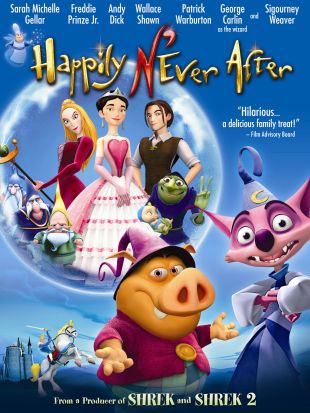
Just when you thought the Shrek movies had said all there was to say in the genre of self-aware animated fairy tales, along comes Happily N'Ever After, which adds -- well, not much more, but enough to be worth making another movie? It's debatable. In terms of its financial resources, Vanguard Animation's Happily N'Ever After is more in line with the previous year's Hoodwinked, from Kanbar Animation. In other words, it's not really fair to compare it to a DreamWorks production like Shrek. The digital animation is relatively crude, the songs are bargain-basement thefts (Sopranos theme "Woke Up This Morning" is ripped off as a villain's march), and the vocal stars are the perennial B-list pairing of Sarah Michelle Gellar and Freddie Prinze Jr. -- 'nuff said. This Cinderella redux sputters out of the gate, with a heavy dose of Prinze's jokily self-referential narration, and a definite has-been quality to the scenarios. Even the supporting vocal talent seems pretty musty -- Patrick Warburton, Andy Dick, and Wallace Shawn are not only veterans of multiple animated movies, but have also played these same characters in those movies (a vapid stuffed shirt, a weaselly sidekick, a neurotic sidekick). But Happily N'Ever After does find its pace a bit in the second act, literally taking flight when a bunch of witches board their motor-powered broomsticks, trailing clouds of colored exhaust as they attack Snow White's cottage, defended by a combat-ready Seven Dwarfs. Their aircraft is not particularly original, either -- Harry Potter and the Star Wars films are both heavy influences -- but at least the context is somewhat new and interesting. In the end, that's the best Happily N'Ever After can hope for -- to find occasional bursts of originality within a played-out framework.
